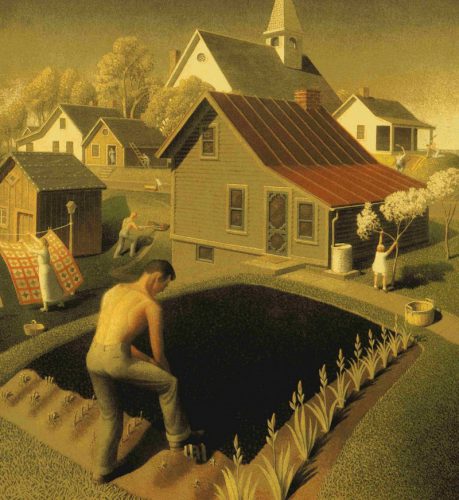

Rural Midwesterners like myself tend to have vegetable gardens. It doesn’t matter if you don’t like vegetables–you grow them because that’s what you do. I’ll refrain from going full Garrison Keillor on you, extolling the virtues of the first tomato of the year, but it’s a thing, really.
Starting with Thanksgiving, through Christmas and New Years, my holiday season is marked by the steady arrival of seed catalogs. The garden might be covered with snow, but for me, the growing season starts before the year ends. Dark days pouring over colorful catalogs filled with promises of huge, blemish-free fruit in overflowing abundance. Sometimes it happens just as advertised. Most of the time it does not. Margaret Roach is on to something when she says in her book, And I Shall Have Some Peace There:
It’s no wonder that much of gardening is done on one’s knees; this practice of horticulture is a wildly humbling way to pass one’s days on Earth.
Gardening and large scale farming both attempt to exert control over nature. If you are a home gardener, like myself, the control we exert is marginal. Just ask the well fed squirrels and rabbits dining on the lettuce and tomatoes. Still we are tempted by looking at the rolling Grant Wood-like fields of wheat or corn in thinking that we have mastered nature. While we certainly have the ability to make life less hospitable for ourselves, we haven’t mastered nature. A single bad growing season, a swarm of insects, a new disease vector we hadn’t considered, and millions of lives can be affected. Farmers through the centuries have understood this. Humility, not as an adopted virtue but as hard reality.
 Wendell Berry, Michael Pollan, and Joel Salatin are all part of a movement of writers and practitioners that have come along at a time when growers in general have leaned more towards hubris and less towards humility. They remind us that not only are we not in control, but that the control we have exerted has forced us, Adam and Eve-like, from the garden. For many of us, we are so disconnected from where our food comes from, it leads to an embarrassing level of hypocrisy. Joel Salatin writes pointedly in his book, Everything I Want To Do Is Illegal:
Wendell Berry, Michael Pollan, and Joel Salatin are all part of a movement of writers and practitioners that have come along at a time when growers in general have leaned more towards hubris and less towards humility. They remind us that not only are we not in control, but that the control we have exerted has forced us, Adam and Eve-like, from the garden. For many of us, we are so disconnected from where our food comes from, it leads to an embarrassing level of hypocrisy. Joel Salatin writes pointedly in his book, Everything I Want To Do Is Illegal:
On a grander scale, when a society segregates itself, the consequences affect the economy, the emotions, and the ecology. That’s one reason why it’s easy for pro-lifers to eat factory-raised animals that disrespect everything sacred about creation. And that is why it’s easy for rabid environmentalists to hate chainsaws even though they snuggle into a mattress supported by a black walnut bedstead.
That hypocrisy may be abating a little.The reaction to these modern-day food prophets has certainly had the effect of raising awareness on our buying choices. Organic, locally sourced, bio-dynamic are all terms most of us have heard by now. Barely a century ago, those terms weren’t defined, because by default, all food was organic and locally sourced. Awareness of what goes into producing that burger or head of lettuce is a good thing. “Eating,” as Wendell Berry has famously said, “is an agricultural act,” therefore has a real-world effect. Being good stewards of the land does have benefits, both for us, personally and collectively.
This awareness has had the effect of raising up new little “L” laws, though. Like we need more! And is it just me, or after watching some of these food and farming documentaries, you feel like you’ve been listening to a Fever Ray song while watching an M. Night Shyamalan movie–confused and unsettled.
While hilarious, JP (in the above video) hits uncomfortably close to home. We think food, exercise, positive thinking, working harder, working less can actually save us. Jesus Himself said in Mark 7:15, “It’s not what goes into your body that defiles you; you are defiled by what comes from your heart.” Ultimately, my salvation won’t come from the dozen open-pollinated, organically grown, heirloom squash I grew myself, or the garlic I harvested this summer, or the sealed containers of seed I’ve harvested over the years, all sitting close to me as I write this. Not even the virtue-signaling I just slipped in there–did you catch that–will save me. None of those things satisfy the Law written on my heart, accusing me of not doing enough, for others, for the planet. John, DJ JAZ, Zahl writes in his Sermons of Grace:
Forgiveness is the only thing that can really deal with the Law’s demands. We will all continue to struggle with the un-evangelized territories of our souls, where we continue to push the button at various points in our loves. But the surprise of grace, which is the Gospel message, will continue to sweeten the pot called “sinner’s stew” to the end of the ages.
I call that relief, and it considerably adds to my enjoyment of supper time.

COMMENTS
One response to “Humility in the Face of Lettuce”
Leave a Reply













I would like to read your new postings.